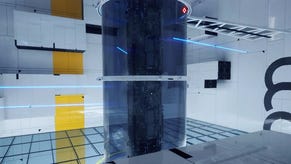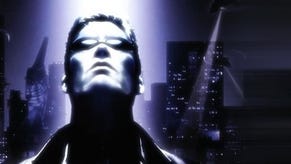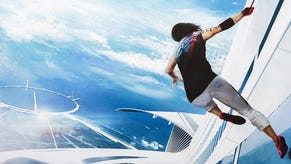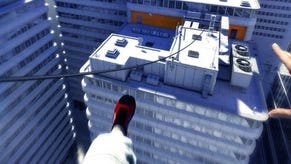Mirror's Edge Catalyst review
Faith no more.
Stop me if you think that you've heard this one before. Mirror's Edge Catalyst is a game of high ambition that is capable of awe-inspiring moments, and one that's all too often undone by a series of suspect design decisions and some truly atrocious combat. It's almost as if, in returning to the much-loved but flawed 2008 original, developer DICE chose to stick a little too closely to an original recipe that called for two parts awesome washed out by two parts awful, introducing some new, even bigger problems all of its own in this troubled open world reboot.
Much has changed for this new Mirror's Edge, but some things stay the same. Faith Connors continues to be one of gaming's great character designs still left in search of a half-decent story: this time out she's a runner fresh out of a detention centre - or 'juvie' as it is in Catalyst's awkward script - and getting reacquainted with the network of runners who stalk the city's skyline in what clumsily ends up an origins tale for future games in the series. Whether they come to pass likely depends on the success of Catalyst, and it does little to endear itself to those who weren't already in thrall to the original.
Faith herself remains the same, an avatar of fleet-footed athleticism who propels the first-person platforming through which Mirror's Edge Catalyst truly soars. At its very best, Catalyst builds upon 2008's Mirror's Edge to create something frequently remarkable: set-pieces within the story missions nestled within the world push the player towards dizzy heights, deciphering their handsomely stylised surroundings with Faith's vocabulary of wall-runs, wall-jumps and mantling. There are moments, when the momentum slows and you're at the foot of an office building figuring out how to get from one point to another, where Catalyst is reminiscent of the excellent Prince of Persia: Sands of Time, in which platforming meets a light sense of puzzling to create one delicious whole.

There are moments, too, where Catalyst combines style and a slick sense of verticality to create something uniquely exciting; a ride stolen on a helicopter above the city's heights, or a late nod to notorious high-wire walker Philippe Petit in which you gingerly step between buildings on a narrow rope, staring nervously into the abyss below. It's all you could have hoped for from a Mirror's Edge sequel, doubling down on what made the original work and providing more of it, with a dash more spectacle.
The sense of motion is, once more, exquisite, told by the weighty sway of the camera as you reach the peak of your sprint, and the glorious sound design as the soles of Faith's feet tread softly on concrete, the whistle of wind in her ears as she falls through the air and the palm-stinging snap of gravel as she lands. Movement, in short, is a treat, but it's all undercut by the problem of there being nowhere interesting to move to.
By rights The City of Glass that plays host to Catalyst should be the star of the show, but instead it's characterless by design, a world smoothed to an impossible sheen by the pantomime corporations you rally against. It's a modernist nightmare of straight angles and anonymity, the city as dreamt up by a Le Corbusier gone positively mad. Unfortunately, it's got all the charm and personality of a second-string airport, where bland spaces meld into each other in one forgettable, unremarkable whole.

As a piece of open world design, Mirror's Edge Catalyst falls entirely flat. The city feels like an afterthought, filled with half-hearted ideas and lazily appropriated systems that make for an awkward fit. There are safe houses to be unlocked for easy fast travel. There's a wanted system whereby you must escape the sights of the city's law enforcement, but it's fuzzy and fussy. There are side missions, though they're often simply repetitive races across the city, while mindless, meaningless collectibles are scattered liberally about. Those collectibles, meanwhile, feel mostly worthless - security chips stolen from panels do little more than tot up XP, while the golden orbs that float around the city would feel like a nod to Crackdown if they were tied into any meaningful sense of progression. It's a soulless checklist of features.
Faith, meanwhile, has many of her abilities locked behind an XP-fuelled system for seemingly no reason other than that's what's expected of a lead character in a contemporary video game. You can sense DICE's heart isn't quite in it; many of her abilities are unlocked from the off, with moves like the forward roll that helps soften a heavy fall available within only a handful of hours of play. All of which makes you question why the system's there in the first place.
It's a strange answer to the problems of the original Mirror's Edge, a game whose originality was obscured by the imposition of combat that only muddied the brilliance of the core. DICE's solution to that particular problem, somewhat tragically, ends up as Catalyst's single biggest failing. In a noble attempt to sidestep the gunplay of the original, Catalyst completely forgoes firearms, opting instead for a freeform first-person melee system. Unfortunately, it's a system that's broken at the point of concept as well as execution.
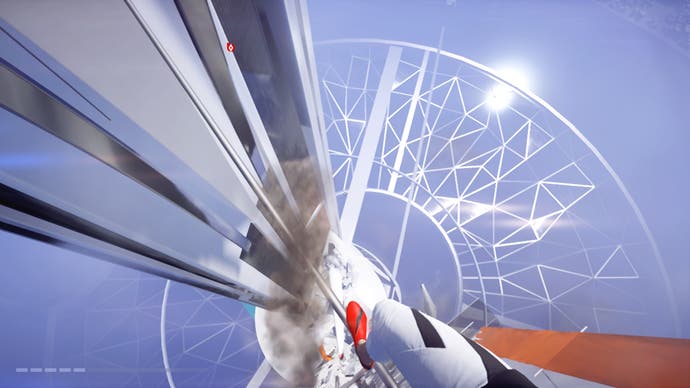
Theoretically, Mirror's Edge Catalyst's combat is powered by the same momentum that's at the heart of the game - you can string attacks into your free-running, taking down enemy soldiers while on the move without breaking the rhythm of your run. That's the theory, anyway. In practice it's a slapstick mess, enemies lunging towards you and cluttering over each other with all the poise of preschool toddlers. The nearest equivalent is the popular party game Gang Beasts - a comparison it's doubtful DICE was inviting when designing its new system. The combat isn't optional, sadly, with several enclosed skirmishes barring the way through Catalyst's story (including the most miserable one which is saved for the very end). It's all enough to make you pine for a gun.
If DICE fumbles in its attempts at combat, it's at least on surer footing elsewhere, and for all the city's faults it's salvaged by its smart, frictionless online that allows players to create and compete in their own time trials. Here, more so than ever before, the promise of free-running feels like it's properly fulfilled. There's a city before you; now go and subvert it. It's fitting that Catalyst's most interesting feature places the power with its players; those same fans, you feel, that helped make a follow-up to the 2008 Mirror's Edge possible.
What a shame, then, that it's an all-too-familiar tale for this sequel. The original Mirror's Edge was always a great idea somewhat obscured - how frustrating to find Catalyst polishes the premise only to find itself burdened with a new set of shackles. It's a slight reward for those who've kept Faith, but this is a sequel that's too often lacking grace.





